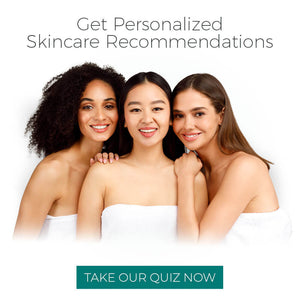When the term “acne” is mentioned, we usually think of pimples on our face. However, acne can affect other parts of our body as well, including our neck. When we’ve got neck acne, it can affect our self-esteem, so let’s take a closer look at what we can do about it.
Demystifying Neck Acne: What Is It?
Neck acne involves pimples that develop on the skin around your neck. You may have facial and neck acne at the same time. However, there are also cases where acne mostly develops on your neck and not so much on your face.
Even though the pimples spread down toward your neck, it’s important to understand that both facial and neck pimples have similar causes and their treatment will also be the same in many cases.
Types of Neck Acne
Not all pimples are the same, which is why you must be able to recognize the different types of neck acne[1] that can develop.
-
Pustules: This type of acne is usually relatively small and appears as a red bump with some inflammation. Pustules don’t have a yellow tip.
-
Papules: Oftentimes, a pustule will develop into a papule. This is the classic pimple that you usually want to poke. You’ll see a yellowish (sometimes white) tip that is filled with pus.
-
Nodules: A nodule usually takes at least a couple of weeks to heal. They’re deeper than papules and also present a pus-filled tip.
-
Cystic acne: These are painful pimples that progress deep into your skin. They are also usually larger than your average pimple and take longer to heal.
Three Contributing Factors to Neck Acne:
Before asking how to get rid of neck acne, it is crucial to understand and address the common factors that contribute to it.
-
Friction: When you wear clothes that fit tightly around your neck or regularly wear scarves that are made from a harsh material, it causes friction on your skin. This friction leads to skin irritation and increases the risk of a breakout.
-
Excessive sweating: Another factor that contributes to neck acne is excessive sweating. It makes your pores more likely to become clogged.
-
Shaving: If you shave very closely to your skin, then you may sometimes notice ingrown hairs. While it’s not something that will come up in a comparison of acne vs pimples, these ingrown hairs can still cause your hair follicles to become infected and lead to a pimple-like bump on your neck.
What Causes Neck Acne?
Apart from the contributing factors that we considered, there are other neck acne causes that you shouldn’t overlook. When you have a better idea about what causes acne on your neck, it’s easier to implement the right type of treatment plan.
-
Skin type: Your skin type can affect your chances of getting acne breakouts. If you have oily skin, your pores are more likely to get clogged[2]. Bacteria, dead skin cells, and other debris can collect in these pores and result in pimples.
-
Comedogenic products: Some skincare products contain comedogenic ingredients, and those can actually cause skin irritation and even result in breakouts.
-
Skin irritation: If you use products that irritate your skin, it can lead to inflammation. When you’ve got inflammation in your skin, it increases the chances of clogged pores, leading to acne.
-
Poor hygiene: Failure to regularly cleanse your skin can also be a contributing factor because dead skin cells, bacteria, and other compounds continuously collect on your skin.
-
Fluctuations in hormones: Sometimes, the cause behind neck acne is hormonal imbalance. This can happen during puberty or when women have their monthly period.
-
Stress: If you’re constantly stressed out, there is a consistent release of cortisol and other stress hormones. While short-term release of these hormones can be beneficial, chronic exposure leads to inflammation and hormonal imbalance which can contribute to acne.
How to Get Rid of Neck Acne?
If you’re struggling with neck acne, it’s important to know how you can treat it. There are several tips and strategies that you can use:
-
Gentle cleansing: Don’t just wash your face. Focus on your neck, too, and make sure you use a cleanser that’s gentle on the skin. The Rejuvoderm Clarifying Cleanser is a great example of a gentle cleanser that works well.
-
Use moisturizer: After cleansing your neck, apply a good moisturizer. This helps to prevent dryness. An option like the Infusoderm Deep Hydration Daily Moisturizer can also help keep your skin hydrated and healthy.
-
Avoid wearing tight clothing: If you wear clothes that fit tightly around your neck, it’s going to cause friction and irritation. Try to wear loose-fitting clothes to help reduce this friction.
-
Apply serum: There are also serums that you can use, which have been specifically formulated for blemishes and acne breakouts. Carefully read the labels, including the ingredients, to make sure the serum is free of harsh chemicals. Zeroblem Blemish Treatment Serum is an excellent choice if you’re not sure which serum to use.
-
Hair care: Proper hair care is essential to prevent clogged pores. Oils and debris can accumulate on hair, especially long hair.
-
Reduce your sweating: Sweating a lot can clog your pores, which then causes neck acne to appear. You can talk to your doctor if you have concerns about excessive sweating.
-
Manage stress: As we’ve mentioned before, stress causes cortisol levels to rise, which can contribute to hormonal imbalances, leading to deep pimples.
-
Balanced diet: If you eat sugary and processed foods all the time, it’s something that can contribute to pimples. A healthy, balanced diet not only helps to clear up acne but also makes your skin look more radiant.
-
Drink plenty of water: Try to drink more water if you’re struggling with neck acne. It will help hydrate your skin[3], too.
-
Wash pillowcases and clothing regularly: Sweat, dead skin cells, and even bacteria collect on your pillowcases and the clothes you wear every day. Make sure to wash pillowcases often and don’t wear clothes for too long before washing them.
-
Use sunscreen on your neck: Your neck is constantly exposed to the sun while you’re outside. When you apply sunscreen, don’t just focus on your face, but also use it on your neck.
What Differentiates Neck Acne from Facial Acne?
There aren’t too many differences between neck acne and facial acne since the causes are generally similar. The only major differences lie in the location where they appear, and how they’re distributed. However, many people find neck acne to be more severe than facial acne.
FAQs
What is neck acne called?
When it comes to acne on your neck, it depends on the type you have. Keloidal folliculitis is a condition that can cause acne due to inflammatory triggers, but you can also get papules, nodules, and pustules.
How do I know if my neck acne is bacterial or hormonal?
If it’s bacterial, you’ll usually notice some inflammation. Pustules and neck pimples are common when bacteria are present. However, if it’s related to hormones, the acne is likely to be deeper and can become quite painful.
How long does it take for neck acne to go away?
The duration of clearing up neck acne depends on several factors such as the type of acne, its severity, the underlying cause, and the treatment being used. In some cases, it may take only a few days to get rid of neck acne, while in other cases it may take several weeks or more.
Can I pop neck acne?
While it’s possible to pop acne on neck, especially if it forms a yellow point, it’s something you should try to avoid at all costs. When you pop acne, it’s going to leave scars on your skin. Popping these pimples can also make the bacteria spread to other pores, worsening your breakout.
Are neck acne and bacne the same thing?
Acne can develop in various parts of your body. The causes behind “bacne” and neck acne can also be similar. That includes bacteria, excess oil, and dead skin cells entering and clogging your pores, resulting in acne.
Conclusion
Acne is commonly associated with the face, but it can occur in other parts of the body as well, including the neck. Clogged pores or hormonal imbalances can cause neck acne. However, with the right skincare routine, you can effectively treat acne on your neck and improve your skin’s appearance. Simply follow the tips we’ve shared, and you should start seeing positive results soon.
References
1] ↑https://www.ncbi.nlm.nih.gov/books/NBK459173/
2] ↑https://www.aad.org/public/everyday-care/skin-care-basics/dry/oily-skin
3] ↑https://www.ncbi.nlm.nih.gov/pmc/articles/PMC4529263/
Mentioned in this article
More stories

How to Repair a Damaged Skin Barrier: 7 Expert Tips






